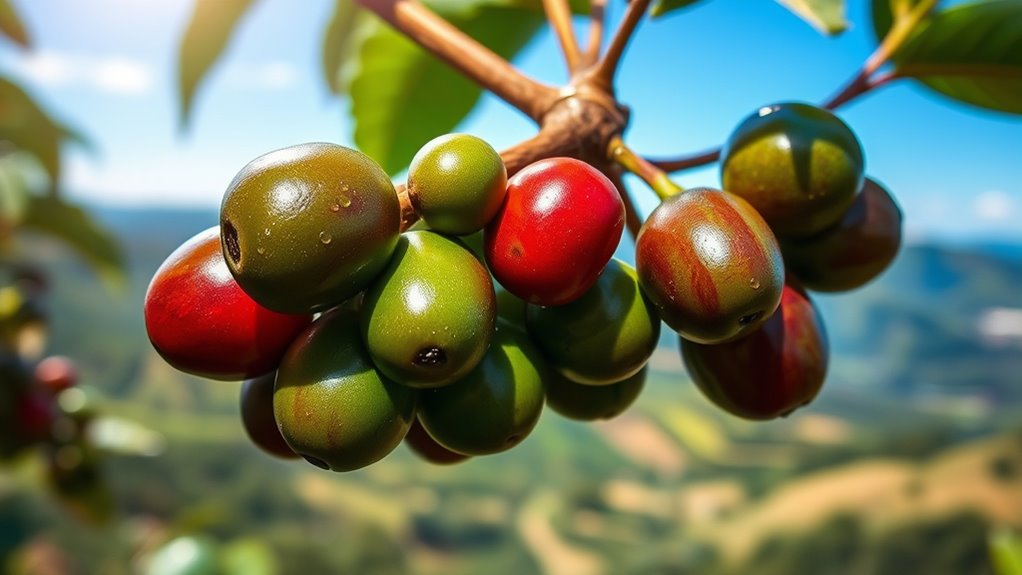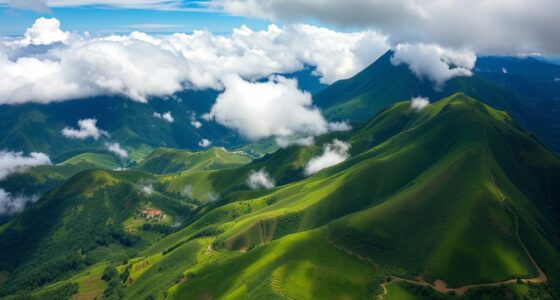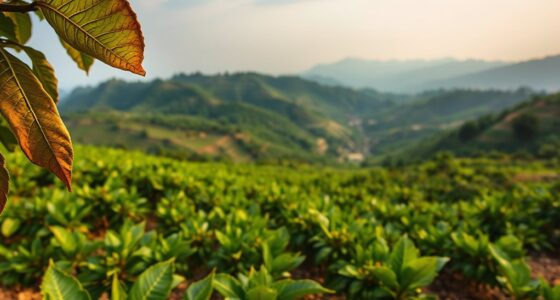Kenyan AA coffee stands out because of its unique growing conditions, such as high-altitude slopes with rich volcanic soil, abundant sunlight, and cool temperatures that develop complex flavors. The meticulous hand-picking and wet processing ensure bright acidity and clean, vibrant profiles. Its superior size and density, graded as AA, guarantee consistency and boldness. These factors combine to produce a coffee with a bright, full-bodied taste that’s truly exceptional—maintain exploring to discover more about what makes Kenyan AA beans so special.
Key Takeaways
- Kenyan AA coffee features large, dense beans graded for size and quality, ensuring superior flavor and consistency.
- Grown on high-altitude slopes with rich volcanic soil, promoting complex and vibrant flavor profiles.
- Hand-picking guarantees only ripe cherries are selected, enhancing bright acidity and bold flavors.
- Washed processing techniques produce a clean, crisp cup with a bright aroma and well-defined character.
- Strict grading standards reflect meticulous cultivation and processing, contributing to Kenya’s reputation for premium coffee.

Kenyan AA Coffee is renowned worldwide for its bold flavor, bright acidity, and full-bodied profile. These qualities stem from the unique methods of coffee cultivation practiced in Kenya, combined with strict bean grading standards that guarantee only the best beans reach consumers. When you taste Kenyan AA, you’re experiencing the result of meticulous attention to detail from farm to cup.
The journey begins with coffee cultivation. Kenyan farmers often grow their coffee on high-altitude slopes, which provides ideal conditions for developing complex flavors. The combination of rich volcanic soil, abundant sunlight, and cool temperatures allows the coffee plants to thrive, producing beans with vibrant characteristics. Farmers typically harvest their coffee cherries during peak ripeness, often by hand, guaranteeing only the ripest cherries are picked. This careful selection process guarantees that the beans develop their full potential, emphasizing the bright acidity and bold flavors Kenyan coffee is known for.
Once harvested, the beans undergo processing, usually through washed or wet processing methods. This approach involves removing the outer fruit layers before drying, which results in a cleaner, brighter cup profile. After processing, the beans are dried to precise moisture levels to prevent mold and preserve quality. This stage is vital because it directly impacts the final flavor and aroma.
Bean grading is another essential factor that elevates Kenyan AA Coffee. The “AA” grade is a classification based on size, density, and overall quality. Larger, denser beans are considered superior because they tend to roast more evenly and develop richer flavors. The grading system helps guarantee consistency, so when you buy Kenyan AA, you’re assured of a product that meets high standards. These beans are typically larger and more uniform than lower grades, which contributes to the bright, lively acidity and complex flavor notes you experience.
The strict grading also involves visual inspection, where beans are scrutinized for defects. Only beans free from blemishes and uniform in size are labeled AA, highlighting their premium status. This attention to detail means you get a cup with a clean, crisp taste and a vibrant aroma. The combination of careful coffee cultivation and rigorous bean grading results in a cup that’s both reliable and distinctive.
In essence, Kenyan AA Coffee’s reputation is built on a foundation of dedicated cultivation practices and stringent grading standards. These factors work together to produce a coffee that’s not only bold and bright but also consistent and of exceptional quality. When you brew and sip Kenyan AA, you’re experiencing the culmination of generations of expertise and passion, making it truly one of the world’s most celebrated coffees.
Frequently Asked Questions
How Does Altitude Affect Kenyan AA Coffee Quality?
Altitude effects play a vital role in Kenyan AA coffee quality by influencing bean maturation. As you grow higher in altitude, cooler temperatures slow down the maturation process, allowing beans to develop more complex flavors and brighter acidity. This extended ripening period results in beans that are denser and more vibrant. So, when you experience Kenyan AA coffee, you’re tasting the benefits of high-altitude effects on bean development and flavor richness.
What Are the Best Brewing Methods for Kenyan AA Coffee?
You should use a medium to medium-fine coffee grind for Kenyan AA coffee, as it helps extract its vibrant flavors. Maintain a brewing temperature around 195-205°F (90-96°C) to reveal its bright acidity and complex aroma. Whether you prefer a pour-over, French press, or drip machine, adjusting your grind and temperature guarantees you get the best, most flavorful brew from these exceptional beans.
Is Kenyan AA Coffee Suitable for Cold Brew?
You can definitely make cold brew with Kenyan AA coffee. Its bright, fruity flavors and full body enhance the cold brew’s invigorating qualities. Plus, Kenyan AA’s shelf life stability means it stays fresh longer, making it ideal for cold brew preparations. The cold brew characteristics—smoothness and vibrant flavor—are perfect for this method, allowing you to enjoy a rich, flavorful coffee experience even days after brewing.
How Does Processing Impact the Flavor of Kenyan AA Beans?
Processing methods substantially impact the flavor development of Kenyan AA beans. Washed processing enhances clarity and bright acidity, making the fruit notes pop. Fermentation adds depth and complexity, highlighting unique regional flavors. Dry processing, on the other hand, emphasizes body and sweetness. You’ll notice how each method shapes the final cup, revealing different nuances. By choosing a specific processing method, you influence the taste profile, ensuring your coffee experience aligns with your preferences.
What Are Common Flavor Notes in Kenyan AA Coffee?
When you taste Kenyan AA coffee, you’ll notice vibrant flavor profiles and distinct tasting notes. Common flavors include bright citrus, juicy berries, and hints of floral or wine-like qualities. These flavor notes result from the high-altitude growing conditions and meticulous processing. As you explore, you’ll appreciate the lively acidity and full-bodied richness that make Kenyan AA beans stand out, offering a truly memorable coffee experience.
Conclusion
When you sip Kenyan AA coffee, you’re tasting more than just a brew—you’re experiencing a symphony of flavor that’s as vibrant as the Kenyan landscape itself. Its bright acidity, full body, and complex notes make every cup feel like a journey through lush plantations and rolling hills. Once you’ve tasted it, no other coffee will quite compare—it’s truly a treasure that elevates your daily ritual to an unforgettable adventure.









